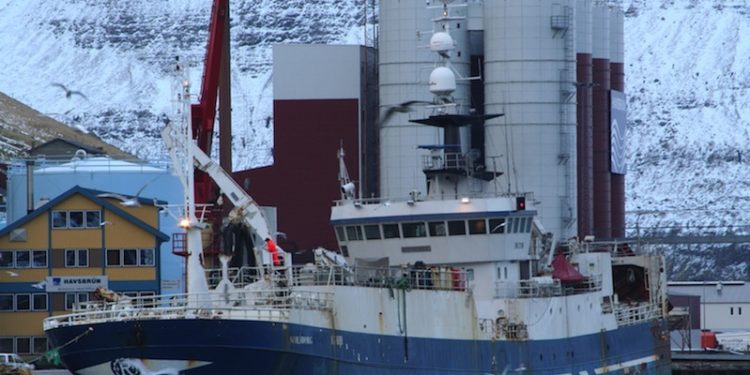Faroese fisheries minister Høgni Hoydal has expressed his surprise at the turn of events that resulted in Iceland suspending access for the Faroese fleet to Icelandic waters, not least at the actions of the Icelandic authorities. He has protested at the decision to rescind the fisheries agreement between the two nations, which he has described as unusual and illegal.
In a statement, Høgni Hoydal said that during a meeting in Tórshavn in December it was not possible to reach an agreement for 2018, and delegations agreed to continue their work and remain in contact so as to achieve a new treaty. But between Christmas and New Year the unexpected step was taken by the Icelandic authorities to end the reciprocal agreement, and he commented that the Icelandic announcement on the state of negotiations does not tally with the Faroese position.
He added that ending the agreement also closes access for the Faroese fleet to the 2018 capelin season.
The Faroese government has been taken by surprise by these developments and have protested at what they call an illegal move, adding that contrary to the statement by the Icelandic ministry of fisheries and agriculture, the Faroese delegation made no new or additional demands as part of the abandoned negotiations for 2018.
‘These were normal negotiations, during which each side expresses its desires, while those issues that had previously not been decided were discussed, as well as items that both parties had agreed on in previous years,’ the minister said.
The Faroese ministry points out that until now Iceland has dictated that after 15th February, Faroese can only land a third of capelin catches for human consumption in the Faroes, while the Froese position is that this requirement is contrary to the terms of the Hoyvik Treaty free trade agreement in place between Iceland and the Faroe Islands.
‘The Faroes have for years wanted to change this item in the fisheries agreement between the two countries. It is impossible to understand that in an agreement on fisheries there should be an item that dictates that catches can not be utilised in a way that yields the highest value and quality, with significant values going to waste,’ Høgni Hoydal said, adding that in early 2017 there was an agreement that officials of both nations would examine this issue not later than the summer of 2017, but this was not done.
‘This is why the Faroe Islands wanted realistic decisions made to pave the way towards rescinding this clause,’ he said.
While the Faroes offered continuing access to Faroese waters for Icelandic vessels fishing for blue whiting and Atlanto-Scandian herring, and put an offer on the table for more access for pelagic fisheries in return for additional groundfish rights in Icelandic waters, Iceland remained unwilling to rescind the capelin restriction and stated that access to more cod in Icelandic waters would mean a 20% reduction in the capelin quota for the Faroese fleet.
‘The result was that there was no basis for an agreement on these terms and further negotiations were postponed, with the agreement that a solution would continue to be sought towards a new treaty,’ the minister said, commenting that in spite of the lack of an agreement, the negotiators parted on positive terms in the expectation that a solution would be agreed.
‘The result has been that since the 31st of December, Icelandic vessels have not been free to fish for blue whiting and Atlanto-Scandian herring in Faroese waters. In the last few years, Icelandic vessels have caught virtually all of their blue whiting in the Faroes,’ he said, making the point that in 2017 Iceland’s pelagic fleet caught 196,300 tonnes of blue whiting and 25,500 tonnes of Atlantic-Scandian herring in the Faroese EEZ.
‘The Faroese fleet are not able to continue to catch groundfish in Icelandic waters in 2018. Faroese vessels have for many years been able to catch 5600 tonnes of demersal fish in Iceland.’
He said that Iceland has taken what he describes as an unusual and illegal step to rescind the rights of Faroese vessels to fish for capelin in Icelandic waters up to 30th April 2018, which was provided for under the agreement reached between the fisheries ministers of the two countries in January 2017.
‘This agreement has been formally recognised in correspondence between foreign ministries as part of the 2017 agreement,’ he said. ‘It is on the basis of this agreement that Icelandic vessels were able to catch almost all their blue whiting and a large part of their Atlanto-Scandian herring quota in the Faroese EEZ in 2017.’
Høgni Hoydal commented that it is surprising that Iceland should walk away from this agreement , not least as Iceland has already taken considerable advantage of the possibilities if offered. He added that a treaty between neighbouring countries is based on the wishes of both, as well as a will to seek out solutions and reach terms that are advantageous to both.
‘We in the Faroes will come to negotiations in the usual way, and in a positive spirit,’ Høgni Hoydal said.









